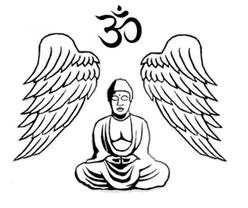ACADEMIC RESOURCES
This page contains academic research related to spirituality.

Includes articles and research by the author:
A Spirituality Research Questionnaire
A Conceptualization of a Model of Spirituality
Research on meditation and addition recovery
A Spirituality Research Questionnaire
A Conceptualization of a Model of Spirituality
Research on meditation and addition recovery
The Cognitive-behavioral Spirituality Scale
A questionnaire designed to measure spirituality. The Cognitive-behavioral Spirituality Scale (CBSS) was developed within the framework of cognitive-behaviorism theory. This framework explains spirituality as a function of beliefs, values, behaviors, and experiences. The indicators in this scale have developed out of the dissertation (Niederman, 1999), “The Conceptualization of a Model of Spirituality”.
Reliability and validity tests on the CBSS were conducted utilizing a convenient sample of college graduate and undergraduate students. The Cronbach alpha reliability for the total scale is .91 (N = 103). Test-retest reliability over a one week period of .86 (N = 70). Discriminant validity was established (N = 82). A confirmatory factor analysis was conducted (rotated three factor component matrix, varimax) which supported the dimensions of the scale (N = 103).
Reliability and validity tests on the CBSS were conducted utilizing a convenient sample of college graduate and undergraduate students. The Cronbach alpha reliability for the total scale is .91 (N = 103). Test-retest reliability over a one week period of .86 (N = 70). Discriminant validity was established (N = 82). A confirmatory factor analysis was conducted (rotated three factor component matrix, varimax) which supported the dimensions of the scale (N = 103).
The Effects of Chi-Kung on Spirituality and Alcohol/Other Drug Dependency Recovery
This article describes the a study on effects of a Chinese breathing based meditative technique (Chi-Kung) on success in an inpatient substance abuse 28-day program. The setting was a state operated 28-day residential substance abuse treatment program, which incorporates a 12 Step program. Participants were randomly assigned to either the meditation group or a control group upon admission to the program. The control group participated in an educational lecture that was already established as part of the treatment milieu.
Participation in the meditation group appears to have contributed to the likelihood of graduation from inpatient treatment. In the meditation group, 15 patients completed treatment (75%). In the control group 11 patients completed treatment (55%).
Participation in the meditation group appears to have contributed to the likelihood of graduation from inpatient treatment. In the meditation group, 15 patients completed treatment (75%). In the control group 11 patients completed treatment (55%).
The Conceptualization of a Model of Spirituality
Short article describing doctoral dissertation.
The Conceptualization of a Model of Spirituality
(Doctoral Dissertation)
The intent of this study was to conceptualize and refine a model of spirituality. The process of model building in this study used an exploratory design utilizing a series of five field trials (N = 380) followed by an interpretive case study design (N = 10) in order to elaborate, refine, and richly describe the dimensions produced by the series of field trials.
ACADEMIC RESOURCES
This page contains academic research related to spirituality.

Includes articles and research by the author:
A Spirituality Research Questionnaire
A Conceptualization of a Model of Spirituality
Research on meditation and addition recovery
A Spirituality Research Questionnaire
A Conceptualization of a Model of Spirituality
Research on meditation and addition recovery
The Cognitive-behavioral Spirituality Scale
A questionnaire designed to measure spirituality. The Cognitive-behavioral Spirituality Scale (CBSS) was developed within the framework of cognitive-behaviorism theory. This framework explains spirituality as a function of beliefs, values, behaviors, and experiences. The indicators in this scale have developed out of the dissertation (Niederman, 1999), “The Conceptualization of a Model of Spirituality”.
Reliability and validity tests on the CBSS were conducted utilizing a convenient sample of college graduate and undergraduate students. The Cronbach alpha reliability for the total scale is .91 (N = 103). Test-retest reliability over a one week period of .86 (N = 70). Discriminant validity was established (N = 82). A confirmatory factor analysis was conducted (rotated three factor component matrix, varimax) which supported the dimensions of the scale (N = 103).
Reliability and validity tests on the CBSS were conducted utilizing a convenient sample of college graduate and undergraduate students. The Cronbach alpha reliability for the total scale is .91 (N = 103). Test-retest reliability over a one week period of .86 (N = 70). Discriminant validity was established (N = 82). A confirmatory factor analysis was conducted (rotated three factor component matrix, varimax) which supported the dimensions of the scale (N = 103).
The Effects of Chi-Kung on Spirituality and Alcohol/Other Drug Dependency Recovery
This article describes the a study on effects of a Chinese breathing based meditative technique (Chi-Kung) on success in an inpatient substance abuse 28-day program. The setting was a state operated 28-day residential substance abuse treatment program, which incorporates a 12 Step program. Participants were randomly assigned to either the meditation group or a control group upon admission to the program. The control group participated in an educational lecture that was already established as part of the treatment milieu.
Participation in the meditation group appears to have contributed to the likelihood of graduation from inpatient treatment. In the meditation group, 15 patients completed treatment (75%). In the control group 11 patients completed treatment (55%).
Participation in the meditation group appears to have contributed to the likelihood of graduation from inpatient treatment. In the meditation group, 15 patients completed treatment (75%). In the control group 11 patients completed treatment (55%).
The Conceptualization of a Model of Spirituality
Short article describing doctoral dissertation.
The Conceptualization of a Model of Spirituality
(Doctoral Dissertation)
The intent of this study was to conceptualize and refine a model of spirituality. The process of model building in this study used an exploratory design utilizing a series of five field trials (N = 380) followed by an interpretive case study design (N = 10) in order to elaborate, refine, and richly describe the dimensions produced by the series of field trials.